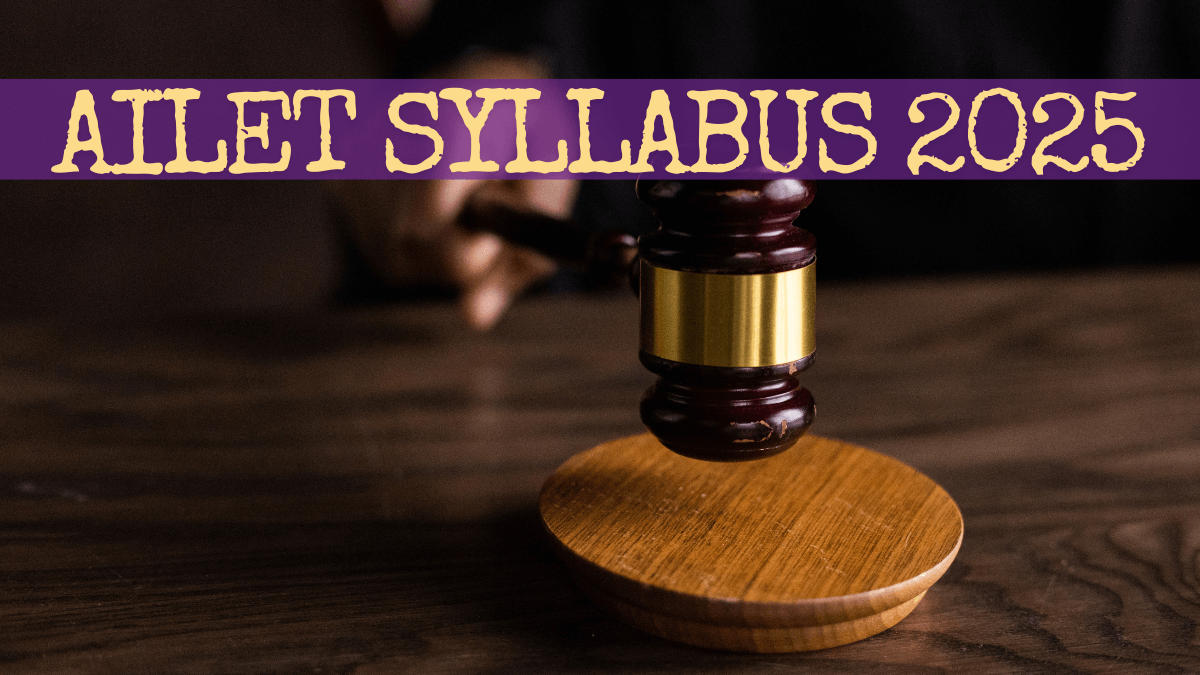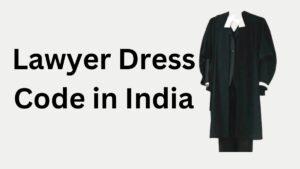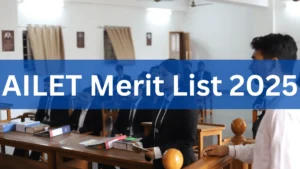The National Law University (NLU), Delhi, has released the updated All India Law Entrance Test or AILET syllabus 2025. To understand and order the topics according to their weight in the exam, before beginning their preparation, candidates must review the revised AILET Syllabus for admission to BA LLB, LLM, and PhD programs. Adda247 is providing you with all the details of the AILET Syllabus 2025 so that you can start your preparations with the right approach.
AILET Syllabus
Before beginning their preparation, candidates must review the revised AILET 2025 syllabus. The AILET syllabus for BA LLB is comprised of three sections: English, Current Affairs and General Knowledge, Reasoning, and Legal Aptitude.
- There will be a total of 150 questions based on comprehension texts. While the subjects in the AILET BA LLB syllabus remain unchanged, the university has increased the test time by 30 minutes. Similarly to the CLAT exam, candidates have 120 minutes to complete the entire paper.
- The AILET LLM Syllabus 2025 has been considerably revised by the university. According to the updated AILET Syllabus for LLM, there will be just 100 objective-type questions and no descriptive-type questions, with all 100 MCQ questions covering various legal themes.
AILET Syllabus 2025 for LLB, LLM
The AILET 2025 exam will be held on December 10, 2023, using pen and paper. NLU Delhi administers the All India Law Entrance Test (AILET) in around 35 exam centers across the country. Through the AILET score, the institution will offer 110 seats in the BA LLB program and 70 seats in the LLM program. The AILET exam syllabus 2025 for each of these programs is distinct. Here is a synopsis of the revised Syllabus.
| AILET BA LLB Syllabus 2025 | AILET LLM syllabus 2025 |
| English language |
Different Branches of Law
(Constitutional Law, Jurisprudence, Administrative Law, Law of Contract, Law of Torts, Family Law, Criminal Law, Property Law, Company Law, Public International Law, Tax Law, Environmental Law, Labour & Industrial Law)
|
| Current affairs and General knowledge | |
| Logical reasoning |
AILET 2025 Syllabus for BA LLB
The AILET syllabus 2025 for BA LLB is divided into three sections: English, Current Affairs and General Knowledge, Reasoning, and Legal Aptitude. Each of the 150 questions in the exam will be based on comprehension passages.
While each question is worth one mark, each erroneous response will be deducted 0.25 points. AILET question papers have become increasingly lengthy in recent years, making it impossible for pupils to complete the test within 90 minutes.
While the subjects in the AILET BA LLB syllabus remain unaltered, the university has added 30 minutes to the test paper. Candidates get 120 minutes to complete the entire paper, similar to the CLAT exam.. Check out the complete subject-wise AILET syllabus for BA LLB.
AILET BA LLB Syllabus 2025 for English
AILET questions will include 35 one-point English questions. The part will cover the following topics in general English and grammar:
- Vocabulary
- Grammar
- Reading Comprehension
- Fill in the blanks
- Inference-based questions
- Synonyms
- Antonyms
- Word Usage
- idioms and phrases,
- Foreign Words/Phrase
- Para Jumble
- choosing the correct words
AILET BA LLB Syllabus 2025 for GK and Current Affairs Section
The section will be worth 35 percent of the total score. Candidates will be asked questions from General Knowledge and Current Affairs on the following topics:
- Economics
- Physics
- Current affairs
- History
- Geography
- General Science
- International events
- UN bodies
- Major developments in the areas of sports, geopolitics, and important environmental agreements
- Current affairs
- Awards and honours
- Eminent personalities
- Sports
AILET BA LLB Syllabus 2025 for Logical Reasoning
This part of the exam will include 70 multiple-choice questions based on logical and analytical reasoning skills.The following are the key subjects covered in the AILET logical reasoning course.
- Series
- Blood Relations
- Directions
- Critical Reasoning
- Syllogism
- Analogy
AILET Exam Syllabus 2025 PDF Download
If you want to download the AILET Syllabus for BALLB in PDF format, then you can do so by simply clicking on the link shared below. you recommended to downloading the AILET Syllabus 2025 PDF and past it on your study table so that it will help to track your preparation efficiently.
AILET LLB Exam Pattern 2025
The AILET (All India Law Entrance Test) LLB Exam Pattern 2025 is as follows:
- Exam Mode: Offline (Pen and Paper-based)
- Type of Questions: Multiple Choice Questions (MCQs) and one Descriptive Section.
- Total Sections: The exam is divided into three sections:
- English Language
- Current Affairs and General Knowledge
- Logical Reasoning
- Number of Questions: A total of 150 questions in total.
- Marking Scheme
Each correct answer: +1 mark
Each incorrect answer: -0.25 mark (negative marking) - Exam Duration: 2 hours (120 minutes)
- Weightage of Sections
- English Language: 50
- Current Affairs & GK 30
- Logical Reasoning 70
- Descriptive Section (Essay)
Candidates may be required to write an essay or a passage-based question in addition to the MCQs.
AILET Syllabus 2025 For LLM Program
The AILET Syllabus 2025 for the LLM course has been drastically altered by the university. Previously, there were sections on English, Legal reasoning, and two descriptive-type questions on legal themes. The AILET 2025 Syllabus for LLM currently closely resembles the CLAT LLM syllabus. However, there will be just 100 objective-type questions and no descriptive-type questions this year. Furthermore, there will be no distinct section on English. All questions from all fields of law will be asked under the new LLM syllabus.
AILET PG Syllabus 2025 (LLM Syllabus)
The AILET PG 2025 syllabus primarily covers topics from law subjects that are part of the undergraduate LLB curriculum. Here’s an overview:
1. Legal Principles and Contemporary Issues
Focus on recent legal developments and contemporary legal topics.
Emphasis on analysis and application of legal principles.
2. Subjects Covered
Constitutional Law: Fundamental rights, directive principles, federal structure, judiciary, parliament, etc.
Jurisprudence: Legal theories, schools of law, concepts like rights, duties, liability, ownership, etc.
Law of Contracts: General principles of contracts, specific contracts, and the Indian Contract Act.
Law of Torts: Negligence, defamation, strict liability, and vicarious liability.
Criminal Law: Indian Penal Code, general exceptions, specific offenses, and procedural law.
International Law: Public and private international law, treaties, and organizations like the UN.
Family Law: Marriage, divorce, maintenance, and succession.
Property Law: Transfer of property, sale, mortgage, lease, and intellectual property.
Environmental Law: Legal frameworks for environmental protection and sustainable development.
Company Law: Corporate governance, formation, and regulation of companies.
3. Question Types
Objective Questions: MCQs based on core law subjects.
Subjective Questions: Analytical and descriptive questions requiring in-depth legal reasoning.
4. Recommended Preparation
Study standard textbooks for core LLB subjects.
Stay updated on recent judgments and legal developments.
AILET LLM Syllabus Topics
The AILET Syllabus for the LLM Program will mainly focus on the Law. According to the official website, questions will be asked from many disciplines of law, with no specific themes specified. The following are the key themes for AILET LLM from where questions will be asked are given below:
- Constitutional Law
- Jurisprudence
- Administrative Law
- Law of Contract
- Law of Torts
- Family Law
- Criminal Law
- Property Law
- Company Law
- Public International Law
- Tax Law
- Environmental Law
- Labour & Industrial Law
AILET LLM Exam Pattern 2025
The AILET LLM 2025 Exam Pattern includes key details about the structure of the exam. Here’s an overview:
1. Mode of Examination
Mode: Offline (Pen and Paper-based)
Type: Objective and Subjective questions
2. Sections
The exam is divided into two parts:
Part A – Objective Questions
Total Questions: 50
Subjects Covered: English language and legal reasoning (based on law subjects like Constitutional Law, Jurisprudence, Law of Contracts, etc.)
Marks Per Question: 1
Total Marks: 50
Negative Marking: Yes, 0.25 marks deducted for every wrong answer.
Part B – Subjective Questions
Total Questions: 2 (from 10 options)
Type: Essay-style descriptive answers
Subjects Covered: Legal issues or contemporary law topics
Marks Per Question: 25
Total Marks: 50
3. Time Duration
Total Time: 1 hour 30 minutes (90 minutes)
4. Key Points to Remember
Part A is compulsory for all candidates. Only those who qualify for the minimum cut-off in Part A will have their Part B evaluated.
The essays in Part B are used to assess a candidate’s analytical ability and understanding of legal concepts.
AILET Syllabus: Subject-wise Wise Weightage
Check out the Subject- wise Weightage of AILET Syllabus 2025 for both BA LLB and LLM programmes.
For BA LLB
| Subject-wise Weightage of AILET BA LLB Syllabus | ||
| Sections | Number of Questions | Marks |
| English Language | 50 questions | 50 |
| Current Affairs & General Knowledge | 30 questions | 30 |
| Logical Reasoning | 70 questions | 70 |
| Total | 150 | 150 |
For LLM Program
| Subject-wise Weightage of AILET LLM Syllabus | ||
| Different Subjects of Law (Constitutional Law, Jurisprudence, Administrative Law, Law of Contract, Law of Torts, Family Law, Criminal Law, Property Law, Company Law, Public International Law, Tax Law, Environmental Law, Labour & Industrial Law) |
100 questions (1 marks each) | 100 marks |
|
Total |
100 |
100 |
AILET PhD Syllabus 2025
The AILET (All India Law Entrance Test) Ph.D. Syllabus 2025 is designed to test a candidate’s aptitude and expertise in legal research. Below is a detailed outline of the syllabus:
1. Research Methodology (50% of the paper)
This section tests the candidate’s knowledge and application of research methods relevant to legal studies. Topics include:
Research Design
Types of Research: Descriptive, Analytical, Doctrinal, Non-Doctrinal, and Empirical.
Problem Identification and Hypothesis Formulation.
Research Ethics and Plagiarism.
Research Tools and Techniques:
Primary and Secondary Sources.
Data Collection: Surveys, Interviews, Case Studies.
Sampling Methods.
Legal Writing and Referencing:
Citation Methods (e.g., Bluebook, OSCOLA).
Drafting Research Proposals.
Data Analysis:
Quantitative and Qualitative Techniques.
2. Subject-Specific Knowledge (50% of the paper)
Candidates are tested on their core legal knowledge and understanding. Some key topics include:
A. Constitutional Law
Fundamental Rights and Duties.
Directive Principles of State Policy.
Constitutional Amendments and Interpretation.
B. Jurisprudence
Schools of Jurisprudence: Natural Law, Positivism, Realism, Sociological.
Theories of Justice.
Concepts: Rights, Duties, Liability, Person, Ownership, and Property.
C. Legal Theories and Principles
Rule of Law.
Separation of Powers.
Judicial Precedents and Interpretation of Statutes.
D. Criminal Law
General Principles of Criminal Liability.
Offenses under the Indian Penal Code (IPC).
Procedural Laws: Code of Criminal Procedure (CrPC).
E. International Law
Sources and Principles of International Law.
Treaties, Conventions, and Customary Law.
International Human Rights.
F. Other Core Areas
Law of Contracts, Torts, and Property.
Environmental Law.
Corporate Law.
Alternative Dispute Resolution (ADR).
AILET Exam Pattern 2025: PhD Course
There will be three sections with multiple-choice questions (MCQs) in accordance with the new AILET PhD format. The following is the format of the AILET 2025 PhD question paper:
|
Type of Questions |
Number of questions |
|---|---|
| The question paper consist questions on subject of Research Methodology | 50 questions |
| The question paper consist questions for different branches of Law, Social Sciences | 50 questions |
|
Total |
100 |
Best Books to Cover AILET Syllabus
Here are some of the best books to cover the AILET (All India Law Entrance Test) syllabus:
1. English Language
“Word Power Made Easy” by Norman Lewis: For vocabulary building.
“High School English Grammar and Composition” by Wren & Martin: For grammar and sentence correction.
“Objective General English” by RS Aggarwal: For practice exercises.
Newspapers and Magazines: The Hindu, The Indian Express, and magazines like “The Week” for comprehension and improving reading skills.
2. General Knowledge and Current Affairs
“Manorama Yearbook”: For static GK.
“General Knowledge” by Lucent: Covers history, geography, and other subjects well.
Daily Newspapers: For current affairs, focus on legal updates, national news, and international events.
Monthly Current Affairs Magazines: Examples include “Pratiyogita Darpan” or websites like GKToday.
3. Legal Aptitude
“Legal Awareness and Legal Reasoning” by AP Bhardwaj: Comprehensive coverage of legal concepts and reasoning.
“Legal Aptitude for the CLAT and other Law Entrance Examinations” by Bhardwaj: Provides conceptual clarity and practice.
Online Resources and Mock Tests: Websites like Law Entrance, LegalEdge, or TestBook provide updated legal knowledge and practice questions.
4. Logical Reasoning
“Analytical Reasoning” by MK Pandey: Covers analytical reasoning topics in depth.
“A Modern Approach to Logical Reasoning” by RS Aggarwal: For practice on reasoning topics like puzzles, syllogisms, and blood relations.
Practice Tests: Previous year AILET papers and reasoning-focused test series.
5. Mathematics (Elementary)
“Quantitative Aptitude” by RS Aggarwal: For basic arithmetic and practice problems.
“Fast Track Objective Arithmetic” by Rajesh Verma: Helpful for quick revision and problem-solving techniques.
NCERT Class 10 Mathematics: Covers fundamental topics.
Additional Resources
AILET Past Year Question Papers: Analyze trends and understand the paper pattern.
Mock Tests and Online Portals: Websites like Career Launcher, IMS, and Unacademy provide AILET-specific test series.
Mobile Apps: LegalEdge, Oliveboard, or GradeUp apps can assist in preparation.
AILET Syllabus Preparation Tips
- Focus on time management by solving mock tests regularly.
- Prioritize current affairs for legal and GK sections.
- Strengthen your weak areas early and revise frequently.
- Practice legal reasoning and mathematics daily.










 Lawyer & Advocate Dress Code in Indi...
Lawyer & Advocate Dress Code in Indi...
 AILET Second Merit List 2025 Out, Downlo...
AILET Second Merit List 2025 Out, Downlo...
 AILET 2025 Second Merit List Out at nati...
AILET 2025 Second Merit List Out at nati...









